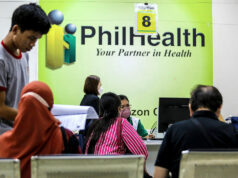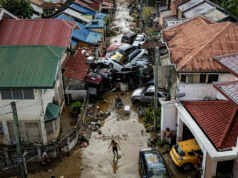Tanauan mayor killed, Duterte ‘suspects’ drug links
President Rodrigo R. Duterte on Monday, July 2, said he “suspects” that slain Tanauan City Mayor Antonio C. Halili was involved in illegal drug activities.
Mr. Duterte made his remarks during the 58th founding anniversary of the province of Southern Leyte at the Provincial Capitol Grounds in Maasin City on Monday evening.
“Nabalitaan nako si Halili karon lang (I received the news about Mr. Halili just now)… Ambot kinsay gapatay pero gi-ingnan ta mo, ayaw lagi. Ayaw gyud (I don’t know who killed [him], but I warned you not to… Never.),” he said.
He likewise likened Mr. Halili to drug-linked slain mayors such as Albuera, Leyte Mayor Rolando R. Espinosa, Sr. and Ozamiz City, Misamis Occidental Mayor Reynaldo Parojinog, Sr. “Pero suspetsa pa lang” (But it’s just a suspicion), he added.
The mayor, who paraded suspected drug dealers through the streets of his city, was shot dead on Monday while attending a weekly flag ceremony for government officials, police said.
Mr. Halili was declared dead on arrival at a hospital from a single bullet wound to the chest, sustained as he and civil servants sang the national anthem in Tanauan, a city in Batangas province southwest of the capital Manila.
“We are shocked, we are saddened,” Vice-Mayor Jhoanna Villamor, who was standing beside Mr. Halili, told radio station DZBB after the shooting.
What appeared to be a smartphone video of the shooting went viral on social media, showing a single shot ringing out as the anthem played, then screaming and pandemonium. The video could not be immediately verified.
Mr. Halili gained prominence for introducing a “walk of shame” parade of alleged drug dealers through his city of Tanauan.
Police say they have killed more than 4,200 suspected drug dealers during shootouts in a bloody war on drugs launched by President Rodrigo R. Duterte two years ago, a campaign condemned by domestic and international human rights groups.
Mr. Halili was stripped of his supervisory powers over local police in October 2017 due to a proliferation of illegal drugs in his city, amid allegations by the Philippine National Police (PNP) that he may have been involved. He denied the allegations.
In an interview with Reuters in August 2016, the second month of the crackdown, Mr. Halili said he backed Mr. Duterte’s campaign but believed drug kingpins should be the main targets, otherwise thousands of people would be killed.
He expressed concern over the way police conducted the war on drugs and the reliability of their intelligence, and that he might be accused of colluding with narcotics gangs.
“No one is safe — mayors, governors, congressmen — just a false intelligence report by the police can end up with any of them being destroyed,” the mayor said in the interview.
“I have a feeling they (police) are going after the small fry to frighten the people,” he said.
For his part, Interior Secretary/Officer-in-Charge Eduardo M. Año said in a statement, “I have directed the PNP, especially Calabarzon police director, P/Chief Superintendent Edward Carranza, to make this case a top priority.”
One investigator told a radio station that a high-powered rifle was used in the attack.
For his part, Presidential Spokesperson Harry L. Roque, Jr., said in his press briefing in Maasin, Leyte, on Monday: “Kinikilala po natin si Mayor Halili bilang mayor ng isa sa pinakaprogresibong bayan ng Batangas. Iyan po ang Tanauan, at nangangako po ang Palasyo na bibigyan ng katarungan ang kanyang pagkamatay. Magkakaroon po ng mabilisang imbestigasyon at paglilitis sa mga taong responsable sa pagpatay nito.”
(We acknowledge Mayor Halili as mayor of one of the most progressive cities in Batangas. That is Tanauan, and the Palace vows justice for his death. There will be a prompt investigation and hearing on the people responsible for his murder.)
Senators also issued their statements in response to Mr. Halili’s murder.
“The killings of priests, prosecutors, and former and incumbent local officials in broad daylight and in full view of the public may be suggestive of the impunity and brazenness of those responsible for such acts,” said Senator Panfilo M. Lacson, a former PNP chief.
“The Philippine National Police should feel challenged, if not taunted. And they must immediately consider stricter firearms control strategies before similar killings could reach ubiquitous levels,” he added.
Senator Juan Edgardo M. Angara urged the PNP and the Department of Interior and Local Government (DILG) to “exhaust all means to bring the perpetrators to justice.”
Senate President Vicente C. Sotto III called the suspect “a coward” for targeting the mayor from a distance.
Senator Paolo Benigno A. Aquino IV said increasing violence in the country was alarming since the perpetrators now target basically anyone. “Whoever, whenever, no one is safe anymore,” he said in a statement.
“When killings are rewarded by the failure of authorities to solve them, it strengthens the culture of violence, where disagreements are settled by permanently silencing the opponent,” Senate President Pro Tempore Ralph G. Recto said in his statement.
Senator Joseph Victor G. Ejercito said in a message to reporters: “One requisite of a developing nation is to have a conducive atmosphere for business to grow. Violent assassinations are blackeyes to this goal of achieving peace for economic development,” he said in a phone message to reporters.
Senator Francis N. Pangilinan for his part said: “We reiterate: the everyday killings of our citizens do not and will not solve the drug problem… It is this Philippine image of a ‘wild, wild west’ that has also dampened the desire of both foreign and local investors from investing, thereby slowing down our economic development and preventing much needed employment and opportunities and jobs for our citizens.”
Human Rights Watch (HRW), for its part, said Mr. Halili’s killing, “like the thousands of killings in the ‘war on drugs’ of the Duterte administration, demands immediate and thorough investigation by Philippine authorities.”
“While we did not agree with Mayor Halili’s method of dealing with crime and illegal drugs in his city, his murder is condemnable. He may have deprived many Tanauan residents of due process but that doesn’t mean he should be deprived of it too. We reiterate our call for an end to the culture of impunity in the Philippines where thousands have been killed in extrajudicial killings of criminal suspects, activists, members of indigenous tribes, journalists, priests, and politicians like Mayor Halili. The only way that can happen is if perpetrators — including Mayor Halili’s killers — are investigated, arrested, charged and tried in a court of law,” HRW also said. — main report by Reuters, with Arjay L. Balinbin and Camille A. Aguinaldo



